S&P Global Offerings
Featured Topics
Featured Products
Events
S&P Global Offerings
Featured Topics
Featured Products
Events
S&P Global Offerings
Featured Topics
Featured Products
Events
Banking & Capital Markets
Economy & Finance
Energy Transition & Sustainability
Technology & Innovation
Podcasts & Newsletters
Banking & Capital Markets
Economy & Finance
Energy Transition & Sustainability
Technology & Innovation
Podcasts & Newsletters
S&P Global Offerings
Featured Topics
Featured Products
Events
12 Jul, 2022
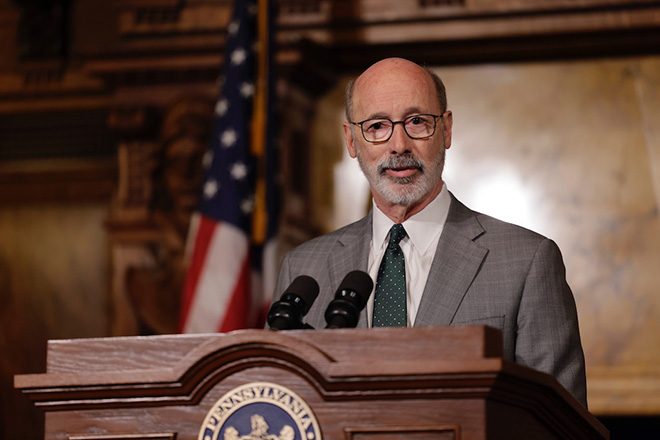
| Pennsylvania Gov. Tom Wolf on July 11, 2022, became the second Democratic state executive to veto a gas ban preemption bill passed by a Republican-controlled legislature. Source: Office of Governor Tom Wolf |
Legislation prohibiting natural gas bans has generated nearly universal support among Republican lawmakers in the U.S., overpowering Democratic opposition in GOP-controlled legislatures. But the rapid spread of the legislation could soon hit a wall.
At least 20 states have barred local governments from restricting gas use in buildings in response to a wave of building electrification mandates in mostly East and West Coast cities. While some of those bills have received broad bipartisan support, a review of 46 state chamber votes by S&P Global Commodity Insights showed that Democrats have opposed passage more often than not.
Across the U.S., 71% of Democratic state lawmakers who have cast a ballot on the issue voted against the bills, compared with 1% of Republicans. The legislation has never passed in a Democrat-controlled chamber.
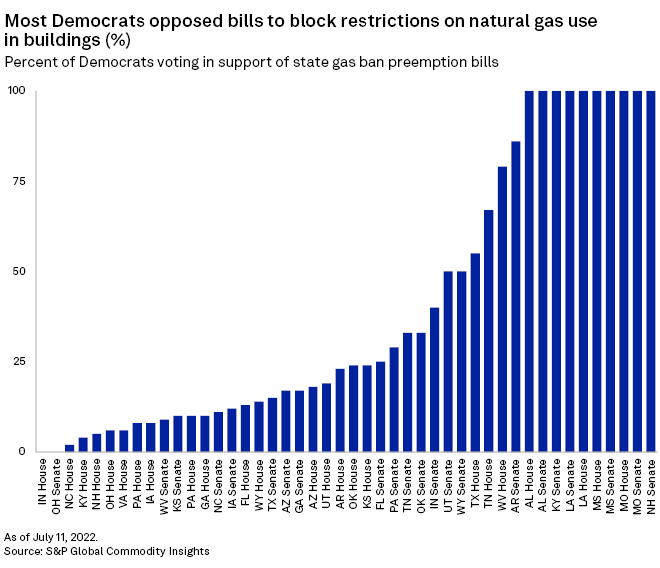
Beyond the 20 legislatures that have already passed bills to preempt local gas bans, only a handful of states remain where Republicans control both chambers and fewer still where a GOP governor gives the party a trifecta. That suggests the prospects for future preemption bills will be limited unless Republicans flip more statehouses and governor's mansions in upcoming elections.
Already, the legislation has begun to stall beyond GOP strongholds. The latest setback came July 11 when Pennsylvania Gov. Tom Wolf vetoed a gas ban preemption bill passed in the GOP-controlled Legislature.
Gas ban preemption bills, bipartisanship
On the political right, lawmakers have voted in near lockstep on the issue. In each of the 46 votes, at least 91% of Republicans supported the legislation. Just over half of the bills garnered unanimous GOP support.
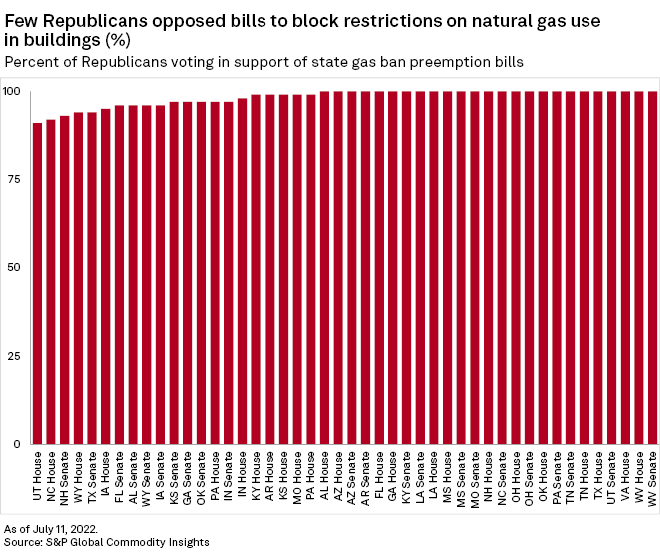
By contrast, fewer than a quarter of Democrats voted in favor of the legislation in 25 of the votes. In 30 votes, fewer than half of Democrats supported the bills. The legislation got unanimous support from voting Democrats in 10 chamber votes. In half of those votes, 10 or fewer Democrats voted.
Six of the votes with unanimous Democratic support occurred in three Deep South states: Alabama, Louisiana and Mississippi. Democrats also threw their full support behind the bills in both chambers of the Missouri Legislature and in the Kentucky and New Hampshire Senates.
However, in the Alabama House, 12 Democrats skipped the vote, compared to 15 who supported the bill. In Missouri, the preemption language passed in a sprawling energy bill.
Applying a low bar for bipartisanship — attracting at least one Democratic vote — all but two of the 46 votes would be bipartisan. Applying a more stringent definition — support from a majority of lawmakers from both parties — just 14 votes, or less than a third of the total, would be considered bipartisan.
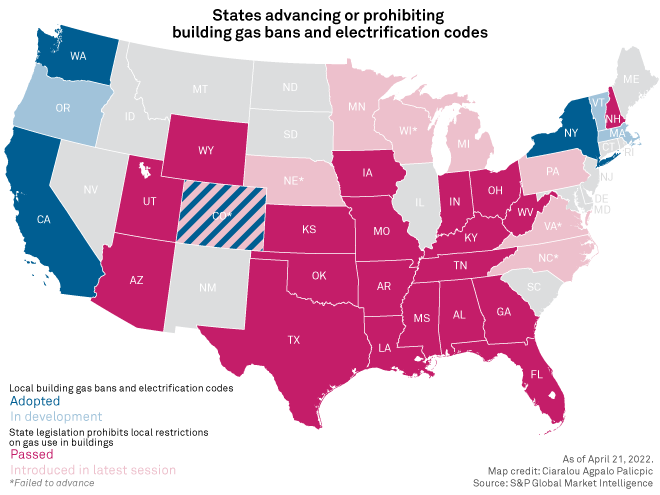
Roadblocks ahead if Democrats stay in office
Republican governors have signed the bills into law in 17 states, but the record in divided states has been mixed.
Democratic governors in Louisiana and Kentucky have signed the bills. In Kansas, the legislation became law without Democratic Gov. Laura Kelly's signature. North Carolina Gov. Roy Cooper, a Democrat, was the first state executive to veto a preemption bill.
In Colorado, where Democrats control both chambers, preemption legislation died in committee in 2021 and 2022. A similar proposal died in Virginia when it advanced from the Republican-held House to the Democrat-controlled Senate.
Since early 2020, lawmakers have introduced multiple preemption bills in Minnesota, but they have made little progress in a state where Democrats control the House and governor's mansion. The legislation has also been dying in Michigan, where Republicans control both chambers but only by slim margins and in a state with a Democratic executive, Gov. Gretchen Whitmer.
Democrats have supported some limits on gas bans. New Jersey Sen. Vin Gopal recently reintroduced legislation that would not allow the state to mandate electric heating until it studies the cost impacts. A Colorado bill requiring utilities to offer building electrification incentives also prohibited state utility regulators from banning new gas hookups or requiring buildings to replace fossil fuel equipment.
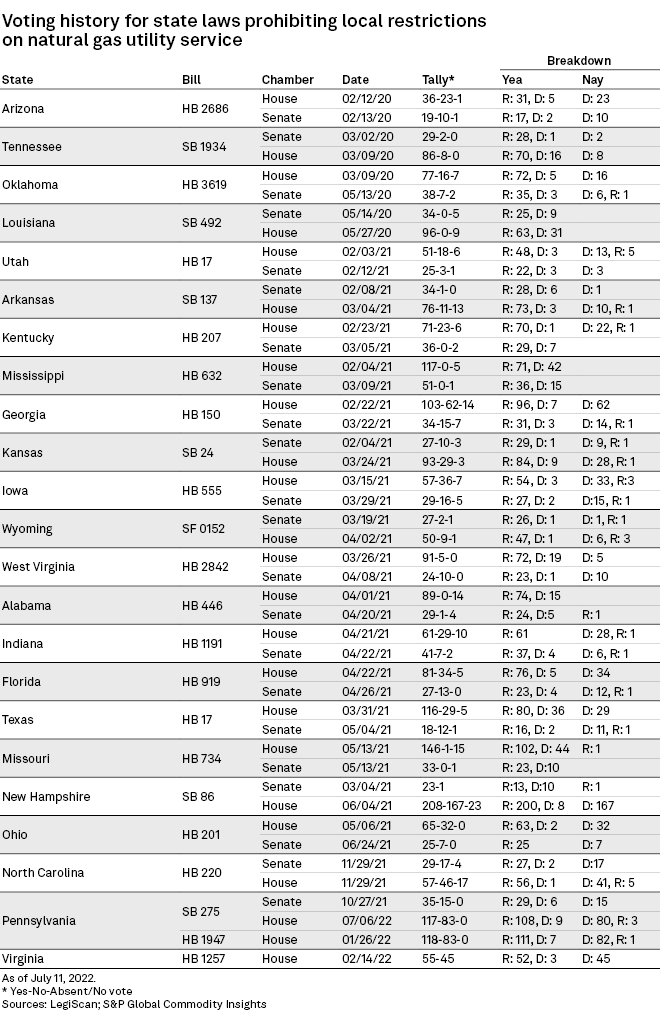
S&P Global Commodity Insights produces content for distribution on S&P Capital IQ Pro.
